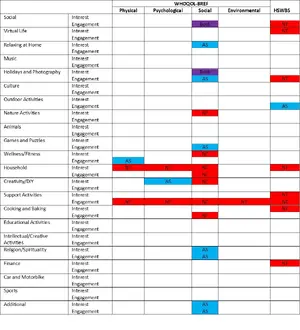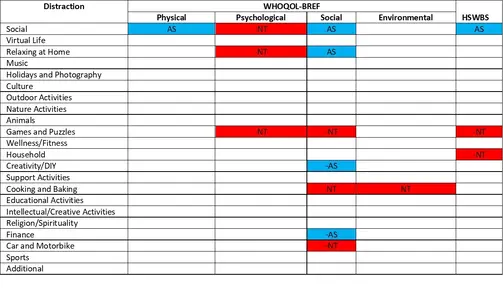SummerAmy
Active Member
Hi everyone 
A while ago I asked for help with my PhD research. I had more responses than I hoped, so thank you to anyone that took part. It means a lot, and hopefully I'll be able to publish the findings so that they may benefit people in the future.
I wanted to share a brief overview of some of my findings, so you can see what people's time and effort went into.
My research is investigating the relationship between interests and well-being. I took measures of how interested people are in each given interest, how often people engage in them, and to what extend they are a distraction. I also took measures of social, physical, psychological, and environmental well-being, as well as satisfaction with life.
Overall, mean interest, engagement, and distraction scores did not relate to any measures of well-being for the autistic participants. For neurotypical participants, mean interest score related to social well-being and mean engagement score related to social well-being and life satisfaction, but distraction score was not related to well-being. I have attached tables showing the individual activity domain relationships, as this is the easiest way to explain it! The coloured cells are where significant relationships are.


I also asked for the motivations behind partaking in preferred interest. AQ score positively correlated with intrinsic interest and knowledge, and engagement and flow (meaning these are higher motivators for autistic people), as well as negatively correlating with personal life values and goals, and prestige (meaning these are less important motivators).
I've been working on a mediation analysis as well, but I don't fully understand the results yet, so I can't update you on that! I hope what I've given is interesting to some of you though! It's not what I expected to find, but that's no reason not to share my findings!
Let me know if you have questions, I'll try my best to answer them.
Thanks,
Summer
A while ago I asked for help with my PhD research. I had more responses than I hoped, so thank you to anyone that took part. It means a lot, and hopefully I'll be able to publish the findings so that they may benefit people in the future.
I wanted to share a brief overview of some of my findings, so you can see what people's time and effort went into.
My research is investigating the relationship between interests and well-being. I took measures of how interested people are in each given interest, how often people engage in them, and to what extend they are a distraction. I also took measures of social, physical, psychological, and environmental well-being, as well as satisfaction with life.
Overall, mean interest, engagement, and distraction scores did not relate to any measures of well-being for the autistic participants. For neurotypical participants, mean interest score related to social well-being and mean engagement score related to social well-being and life satisfaction, but distraction score was not related to well-being. I have attached tables showing the individual activity domain relationships, as this is the easiest way to explain it! The coloured cells are where significant relationships are.


I also asked for the motivations behind partaking in preferred interest. AQ score positively correlated with intrinsic interest and knowledge, and engagement and flow (meaning these are higher motivators for autistic people), as well as negatively correlating with personal life values and goals, and prestige (meaning these are less important motivators).
I've been working on a mediation analysis as well, but I don't fully understand the results yet, so I can't update you on that! I hope what I've given is interesting to some of you though! It's not what I expected to find, but that's no reason not to share my findings!
Let me know if you have questions, I'll try my best to answer them.
Thanks,
Summer